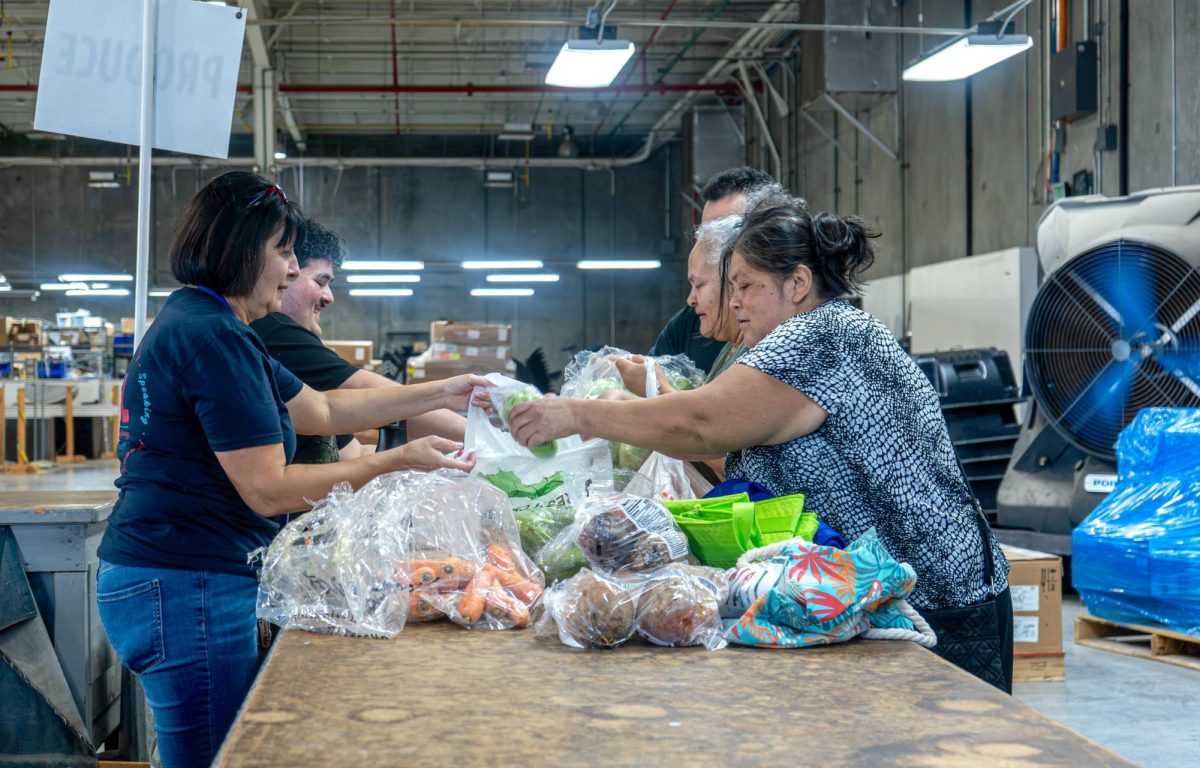
DIEGO SANTOS
NW student and Intercultural Network employee Fabian Palacios and Instructional Aid for Humanities Olena Sviridova bag food donated by Tarrant Area Food Bank. NW Campus' monthly food market in one of its old aviation hangars.
As the NW Campus food market starts its 10th year, volunteer Lourdes Davenport said she has seen that food insecurity affects everyone.
“It’s anybody you run into anywhere in the community,” said Davenport, coordinator of the English Language Learning Program. “It’s our high school kids. It’s our college students. It’s their parents, their grandparents. There isn’t one demographic solely this food market serves.”
Texas is the most food-insecure state in the nation, according to a May 14 study by Feeding America. The Dallas-Fort Worth area currently ranks No. 3 in the nation for the highest number of people experiencing hunger, with 60% living in the Tarrant and Dallas counties.
Food insecurity is defined as not having access to sufficient food or quality food to meet one’s basic needs.
Monthly food markets are hosted on every campus for anyone in the community, and donations are provided by Tarrant Area Food Bank. Student and faculty volunteers run the market’s operation by unloading pallets, setting up tables, bagging food and guiding visitors through the facility.
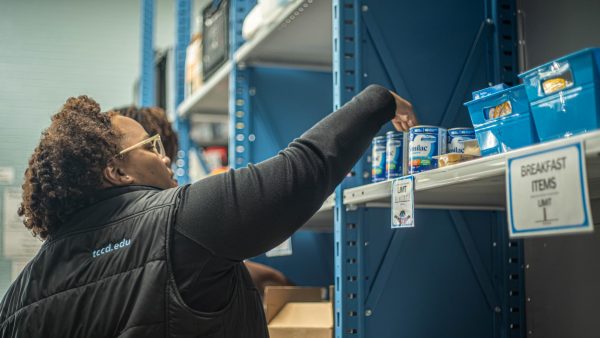
“It really takes a village to put the market on,” Davenport said. “The number of families served through this food market is upwards of 2,000 people in Tarrant County.”
NW student Fabian Palacios volunteered at the market on Sept. 19 and said he knows first-hand how it aids the community’s hunger issue.
“My family, we go to food markets when we need it and take it for our family and to our neighbors,” Palacios said. “It helps when the money is not enough to buy all the groceries that we need, especially with fluctuating prices right now.”
Markets help lighten the financial load of groceries by providing people with produce and ingredients. Palacios said getting the more expensive items from a market, such as produce and dairy, gives families the ability to set extra funds aside they normally wouldn’t have.
“I think mentally, it’s also a relief to know that there’s somebody there to help you,” Palacios said.
The market is essential, Davenport said, and they try to reach everyone in the community through the necessary goods they supply.
However, some people don’t have a stable home with a pantry to store items or a kitchen to cook in.
“I don’t like staying around where I’m at because it’s real foul over there,” said South student Anthony Vilano, who lives in a shelter. “Sometimes I have to force myself to eat, you know.”
Vilano picked at his guitar strings while sitting in the cafeteria between classes. He said living in a shelter is distracting but the food pantry on campus allows him to be somewhere he feels productive.
“It takes a lot of stress out of my mind about what I’m going to do later,” Vilano said.
Toro’s Food Pantry is available on South, NE and NW campuses, where students can check in to grab essential items donated by the Tarrant Area Food Bank and TCC’s faculty and staff.
“I’m able to save a lot more because they’ll have something. A little snack. Usually something healthy,” Vilano said. “They’ll have little soaps that make it real convenient, so I don’t have to run all over the place, spending money up the street.”
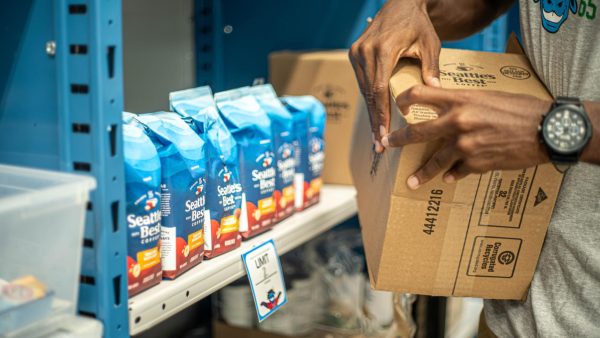
Any current TCC student can access the pantries on any campus by bringing their student ID.
Jasmine Quezada, NW coordinator of Intercultural Student Engagement and Academic Success, said in the past academic year, their pantry had about 2,600 students check in.
“It’s difficult maintaining both work and academics and then having to worry about food. It’s an additional piece of worry for students,” Quezada said. “It really alleviates them from having to go to the gas station or having to go back home and then having to come back.”
NW Campus’ pantry is located in their Intercultural Network room, but Quezada said the new facility should open once construction is completed near the end of spring.
“It’s part of our goal to make sure that we can do every single little bit that we can,” Quezada said. “When we see the need, we see the amount of students that check in, we know the need is there, so we really try to continue supporting it.”
Each campus has a slightly different pantry process, but NE Student Activities Coordinator Courtney Matthews-Roberson said TCC is working on developing the student experience to be the same on every campus.
“It may look differently in size or in the food offerings itself, but making sure our intake is aligned is something our vice president of Student Affairs is working on right now,” Matthews-Roberson said.
A’Derion Mayshaw, a NE Student Government Association treasurer and student worker, was a pantry visitor before becoming an employee.
“I was one of those students that really didn’t have a lot when I first got here. I didn’t really have a lot of money,” Mayshaw said. “The food pantry, it was accessible, and I could get a couple snacks on my way to class.”
He said the pantry should be used by all students because they need to be fueled to be able to get through the semester.
“First and foremost, I love food. Food is my favorite. Breakfast, lunch, dinner,” Mayshaw said. “We all need it. It’s nutritious. And what we put it in our bodies is what we’re going to give out to the world.”
Matthews-Roberson said the pantry doesn’t turn students away for any reason.
“People struggle with food insecurity all the time,” she said. “It’s not something that they’re going to say outwardly or as confidently because that can be very hard. It can be triggering and difficult.”
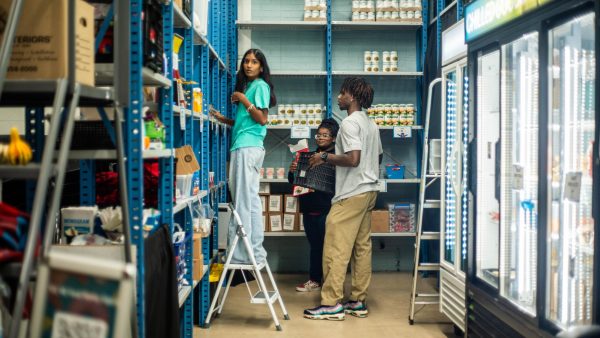
She said this is one of the reasons why TCC started to host monthly markets over the summer to continue supporting students even though they may not have class.
“Bring your friends, bring your neighbors, bring your other co-workers to [the market],” Roberson said. “Get what you need for your household so that you’re not feeling insecure about making a meal or being sustainable.”
Developing the pantry’s procedures to be accessible for all students was a priority for Kiesha Shelton, South Campus’ Family Empowerment Center coordinator. She said when she started as a faculty member teaching a transition to college success class a year ago, she noticed there could be areas for improvement.
“I taught it at night, and back in the day there used to be nothing on campus,” Shelton said.
South’s cafe closes at 3 p.m. and the pantry closes at 4 p.m., and both are only open Monday to Thursday. While students can order food for delivery or pickup, Shelton said this is costly and shouldn’t be the only options available.
“We partnered with the Learning Commons, their labs, and we place pre-bagged items, food items, non-perishable of course, in those centers,” Shelton said. “The beauty of it is that they’re available in the off hours that we’re not open. So, nights and weekends, those are available to students.”
She said student workers bag the items and switch them out regularly to check expiration dates. However, the Tarrant Area Food Bank recently made snack packs available to the pantries.
“They had already pre-packaged bags with way more than we could ever imagine,” Shelton said. “We’re so excited because it’s cereal, it’s shelf-stable milk, it’s pasta snacks, and it’s granola bars.”
Each campus’ food pantry orders from Tarrant Area Food Bank’s website. What is orderable is based off what is donated, so item’s availability can change weekly.
However, Shelton said they keep students’ dietary needs in mind every time they order.
“We want to make it healthy and nutritious, not just snacks,” Shelton said. “The food insecurity is real for our students, and for the Toro’s Food Pantry at South Campus we try to make sure we have a variety of options for those students.”
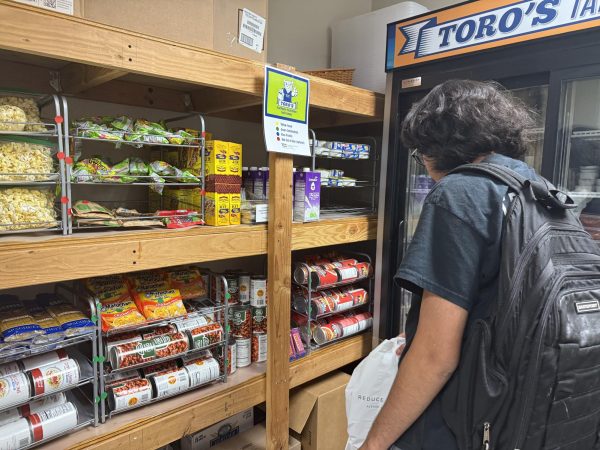
Toro’s Food Pantries offer canned goods, refrigerated and frozen items, packets of noodles and rice. They also carry different microwavable meals and ready to eat snacks, and each pantry has an accessible microwave nearby.
“One of them died because it was being used back-to-back-to-back. But now we have three,” Shelton said. “We have a can opener, like we try to make sure they come to visit the pantry for whatever they may need. We got school supplies, everything.”
Feminine hygiene products, travel size shampoos, deodorants, toothbrushes, toothpaste and mouthwash are available at all of Toro’s Food Pantry locations. South Campus even has unused school supplies donated by students at the end of the semester.
“Those things are small but mighty,” Shelton said. “When there’s a need and someone sees it, they can grab it, and there’s no fear, no shame or anything. Just get what you like.”
Since the pantries work off donations, the stock isn’t always consistent. Shelton said to try and keep high demand items in stock, they created an Amazon wish list for faculty. When the pantry recognizes students have specific needs, they add those items to the list and faculty members can purchase them as donations.
“I call it Amazon Christmas,” Shelton said. “That’s something new we started about a year ago, and it actually helped.”
The Korean Culture Club used the full kitchen in the Family Empowerment Center for a cultural food demonstration. While there, Shelton asked if there was anything they’d want added to the food pantry, and they asked for chopsticks and sticky rice.
“We added sticky rice to our Amazon list, and man, it came in and it was gone the same day,” Shelton said. “It’s not just Korean Culture Club that used the rice. Everyone loved the sticky rice. I was like ‘Oh my gosh, I didn’t know sticky rice was so popular.’”
South student Shelby Story works for the pantry, and she said it’s been an eye-opening experience to see students’ reactions to the food their pantry serves.
“It helps put into perspective of how somebody may need something because they want it,” Story said. “It can brighten their day. They come in here and be like ‘Oh, I haven’t had this before. I really wanted to try it,’ and they get to.”
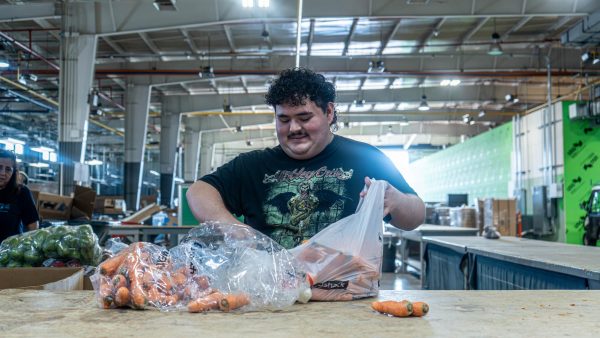
Students can visit South’s pantry once a day. Inside they have a color system limiting the number of certain items students can take during their visit. However, Story said the pantry does its best for every student and won’t let them leave unsatisfied.
“They can come in without any shame whatsoever, get whatever they need,” Story said. “It’s for all students.”
Vilano said the food pantry positively impacts students’ lives, and the most important thing it provided him with is stability.
“I don’t have to provision about all these different things,” Vilano said. “The food pantry takes an insecurity and gives it security.”
Below are flyers with information on fresh markets